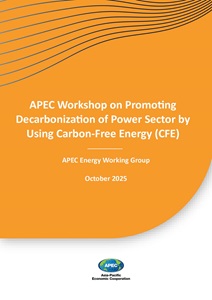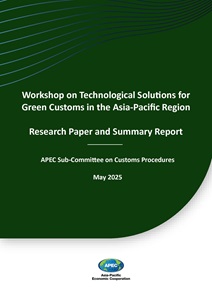
Proceedings
APEC Workshop on Promoting Decarbonization of Power Sector by Using Carbon-Free Energy (CFE)
The Asia-Pacific Economic Cooperation (APEC) is a regional economic forum established in 1989 to leverage the growing interdependence of the Asia-Pacific.
The Asia-Pacific Economic Cooperation (APEC) is a regional economic forum established in 1989 to leverage the growing interdependence of the Asia-Pacific.
APEC ensures that goods, services, investment and people move easily across borders. Members facilitate this trade through faster customs procedures at borders; more favorable business climates behind the border; and aligning regulations and standards across the region.
APEC ensures that goods, services, investment and people move easily across borders. Members facilitate this trade through faster customs procedures at borders; more favorable business climates behind the border; and aligning regulations and standards across the region.
APEC works to help all residents of the Asia-Pacific participate in the growing economy.
APEC works to help all residents of the Asia-Pacific participate in the growing economy.
Capacity building projects play an important role in helping translate APEC's goals into reality.
Capacity building projects play an important role in helping translate APEC's goals into reality.

Reports
•May 2025
Download Report
4MB
Published Under
Committee on Trade and Investment (CTI), Sub-Committee on Customs Procedures (SCCP)
Accessed
711
Pages
74
This publication contains the results of the project: Workshop on Technological Solutions for Green Customs in the Asia-Pacific Region. The objective of this project is to improve the capacity of customs administrations to identify and control illegal trade in goods that have a negative impact on the environment, focusing on compliance with Multilateral Environmental Agreements (MEAs) such as the Basel Convention, the Montreal Protocol and the Convention on International Trade in Endangered Species of Wild Fauna and Flora - CITES. It also includes species such as timber, fauna and hydrobiological resources, which are not protected under CITES but are regulated by domestic regulations that also seek to guarantee their sustainable trade.
This publication includes the Research Paper and Summary Report of the workshop, which together detail the process undertaken to identify innovative technological solutions available globally and in line with the customs realities of the Asia-Pacific region. This project focuses on Customs Laboratory-assisted front-line controls, promoting collaboration and technical assistance between Customs, Academia, international organizations, NGOs, the private sector, as well as cooperation between APEC fora.

